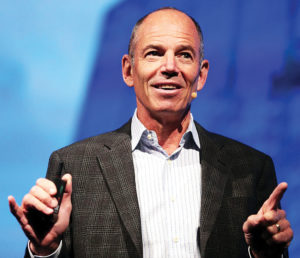Movie Moghul of another kind, founder of Netflix Marc Randolph spins a fascinating tale in which the reader finds herself rooting for him to succeed as the action plays out scene by scene
Stories about successful businesses have one common factor: They expect the reader to believe that it wasn’t luck that turned an idea into a million-dollar enterprise — it was hard work and clever management. But applying the analogy to movies — it isn’t always the best movie that is a box office hit. Something just clicks and puts a film on top of the charts. Whereas another film which an individual might think is brilliant only receives critical acclaim and is rejected by the masses. There’s no lesson to be drawn from such books about entrepreneurial wisdom, really – unless it is the cliched ‘Follow your dream’.
Be that as it may, this book by the co-founder and first CEO of Netflix makes for compelling reading. Curiously, it was not first published in the US but in the UK by Endeavour, an imprint of Octopus Publishing Group and is brought to us in India by Hachette. That Will Never Work: The Birth of Netflix and the Amazing Life of an Idea by Marc Randolph, tells the gripping tale of a business idea that started off as a Silicon Valley venture wooing people to order DVDs online and receive them in envelopes via the good old post office. The dismissive sentence in the title came from Randolph’s wife, when he first told her about his idea for a startup.
For those who only know Netflix as the online streaming platform, this book comes as a revelation. Apparently, the business was started in 1997 – the kernel of the idea being to save people the bother of driving down to video rental stores to order a movie and then going back to return it, often paying a late fee. The neat story offered to media is that of a ‘light bulb moment’ – that venture capitalist Reed Hastings was peeved about having to pay a late fee of $40 for a copy of Apollo 13.
Randolph tells us: “Epiphanies are rare. And when they appear in origin stories, they’re often oversimplified or just plain false. We like these tales because they align with a romantic idea about inspiration and genius. We want our Isaac Newton to be sitting under the apple tree when the apple falls. We want Archimedes in his bathtub.”
The truth, he continues, “is usually more complicated than that”. It is these complications, these ups and downs, the personal and financial decisions, the clever recruitments and painful layoffs, that make up the bulk of the book. Breathlessly, you wait for the moment when you will be told how the whole streaming miracle happened. But disappointingly, this part is skipped. There is only a hint that they realise that the competition is working on the streaming idea, and that Netflix will have to go down the same path. But the book ends in 2003, when Randolph quits the company to mentor other startups.
It’s interesting to see the list of names mooted for the venture before ‘Netflix’ was chosen – a bit reluctantly. In one column, the team noted down names related to the internet. The other column had words related to films. Then they were cross-matched, like kindergarten children are asked to match ‘cow’ and ‘milk’. So they came up with TakeOne, TakeTwo, SceneOne, SceneTow, Flix.com, Fastforward, NowShowing, Directpix, Videopix, E-Flix.com, CinemaCenter, WebFlix, CinemaDirect and NetPix. The reluctance came from the fact that ‘flix’ reminded the team of porn. But finally they decided “it was the best we could do.”

Another eye-opening episode in the book related to the bid to sell the business to Amazon, then only a few years older than Netflix, and selling only commodities. At the time, Jeff Bezos was 34, looking to acquire smaller companies. The meeting takes place in Amazon’s Seattle office, a ramshackle four-storey building in which tables are made of repurposed doors. Bezos explains, “It’s a way of saying that we spend money on things that affect our customers, not on things that don’t.” The deal doesn’t come through because Reed quotes a very high figure, but the whole atmospherics of the meeting is memorable. Especially in today’s age, when both Amazon Prime and Netflix are such a big slice of the entertainment pie.
Midway through the narrative, there is the day when Reed drops a bombshell. He starts by making a PowerPoint presentation and then says, no sugarcoating, “But I’m losing faith in your ability to lead the company alone…So I think the best possible outcome would be if I joined the company full time and we ran it together. Me as CEO, you as president.” Obviously, Randolph’s first reaction was “It had been my idea. My dream. And now it was my business. While Reed had been off at Stanford and at TechNet, I’d been pouring my entire life into building the company.” He is hurt at first but soon accepts the harsh reality. In India, not many entrepreneurs can let go of their baby for purely professional reasons. But then, Netflix was not the first company he founded.
Randolph’s descriptions of himself as a family man paint an enviable portrait of a perfect work-life balance. There he is at 5 am, spoonfeeding their third child as the mother gets the other two children ready for school. He has a date with his wife every Tuesday at 5 am, no matter what the crisis in office. They buy a large house and then he himself clears the bush in the backyard, and wonders when he will find the time to redecorate. When he jets off in a private plane to watch the opening of Netflix’s IPO, he takes his eldest son along. In India, we only see such men in Raymonds ads – and certainly not among business families.
As readers, we will obviously, inevitably be looking for the Indian techie who is part of the enterprise. There is a ‘talented engineer called Suresh Kumar’ but he is never given the courtesy of a physical description. He seems faceless, colourless and has none of the quirks of other employees described in loving detail. He sticks on for 21 years, a permanent fixture, while other founding members go on to set up enterprises on their own. On top of that, we are told that “our hires from India were totally bewildered by the practice” of asking new employees to come to the monthly meeting wearing a costume from their favourite movie. He admits that they thought of it as “hazing” (ragging). Aw shucks.
Still, there are enough funny episodes to keep us hooked. In 1998, they decide to copy Bill Clinton’s testimony in the Monica Lewinsky case on DVDs and sell it before anybody else got the same idea. They issue a press release, saying sanctimoniously that “Congress released the material with the intent that it be made available to the widest possible audience.” They got 5,000 new customers in the process. But in the race to pick up the DVDs and dispatch them, they picked up the wrong bundle and many customers received a blue flick. The company apologized, and told customers that if they returned the porn, they would be sent the Clinton. But not a single DVD came back!
In the end, the writer tries to tell us his secrets of success, saying that these were the wisdom passed onto him by his father. ‘Do at least 10% more than you are asked. Be open-minded but skeptical. Don’t be afraid to make decisions when you have the facts on which to make them’. But all this sounds lame, like homilies you are told in school. It’s better to remember the quote he gives us from William Goldman, who wrote the screenplay for Butch Cassidy and the Sundance Kid and The General’s Daughter. He famously said the three keywords to understanding Hollywood are: ‘Nobody Knows Anything’. Randolph adds his own two bits: “There are bad ideas. But you don’t know an idea is bad until you’ve tried it.”
And you can buy the book on Amazon!





